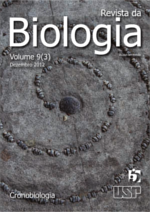Time estimation in humans: basis, ontogenesis and daily variation
DOI:
https://doi.org/10.7594/revbio.09.03.14Keywords:
Chronobiology, Time perception, Timekeeping systemsAbstract
Timing is necessary for the expression of complex behaviors such as to speak and to cross a street. Several models have been elaborated to describe the phenomenon and the underlying neural basis indicates the role of cortical and sub-cortical areas. Time estimation varies in an age-dependent way and is influenced by emotions and sleep pressure, besides being, at least in part, controlled by the circadian timekeeping system. It is a booming area of research and is intended to understand how temporal processing occurs in different levelsDownloads
Download data is not yet available.
Downloads
Published
2018-04-23
Issue
Section
Revisão
License
We ensure that our journal does not retain any copyright and that these are exclusive of the author(s) of the text. In that sense, we intend to break any restrictions to the published material and to achieve more intensely our goal of communicating science.
How to Cite
Miguel, M. A. L. (2018). Time estimation in humans: basis, ontogenesis and daily variation. Revista Da Biologia, 9(3), 74-79. https://doi.org/10.7594/revbio.09.03.14






